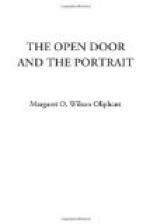This gave me a little comfort,—more than Simson had given me. To be clear about the cause of it was not my grand desire. It was another thing that was in my mind,—my boy. As for the poor soul at the open door, I had no more doubt, as I have said, of its existence than I had of my own. It was no ghost to me. I knew the creature, and it was in trouble. That was my feeling about it, as it was Roland’s. To hear it first was a great shock to my nerves, but not now; a man will get accustomed to anything. But to do something for it was the great problem; how was I to be serviceable to a being that was invisible, that was mortal no longer? “Maybe at the moment the Lord will put it into our heads.” This is very old-fashioned phraseology, and a week before, most likely, I should have smiled (though always with kindness) at Dr. Moncrieff’s credulity; but there was a great comfort, whether rational or otherwise I cannot say, in the mere sound of the words.
The road to the station and the village lay through the glen, not by the ruins; but though the sunshine and the fresh air, and the beauty of the trees, and the sound of the water were all very soothing to the spirits, my mind was so full of my own subject that I could not refrain from turning to the right hand as I got to the top of the glen, and going straight to the place which I may call the scene of all my thoughts. It was lying full in the sunshine, like all the rest of the world. The ruined gable looked due east, and in the present aspect of the sun the light streamed down through the door-way as our lantern had done, throwing a flood of light upon the damp grass beyond. There was a strange suggestion in the open door,—so futile, a kind of emblem of vanity: all free around, so that you could go where you pleased, and yet that semblance of an enclosure,—that way of entrance, unnecessary, leading to nothing. And why any creature should pray and weep to get in—to nothing, or be kept out—by nothing, you could not dwell upon it, or it made your brain go round. I remembered, however, what Simson said about the juniper, with a little smile on my own mind as to the inaccuracy of recollection which even a scientific man will be guilty of. I could see now the light of my lantern gleaming upon the wet glistening surface of the spiky leaves at the right hand,—and he ready to go to the stake for it that it was the left! I went round to make sure. And then I saw what he had said. Right or left there was no juniper at all! I was confounded by this, though it was entirely a matter of detail nothing at all,—a bush of brambles waving, the grass growing up to the very walls. But after all, though it gave me a shock for a moment, what did that matter? There were marks as if a number of footsteps had been up and down in front of the door, but these might have been our steps; and all was bright and peaceful and still. I poked about the other ruin—the larger ruins of the old house—for some




